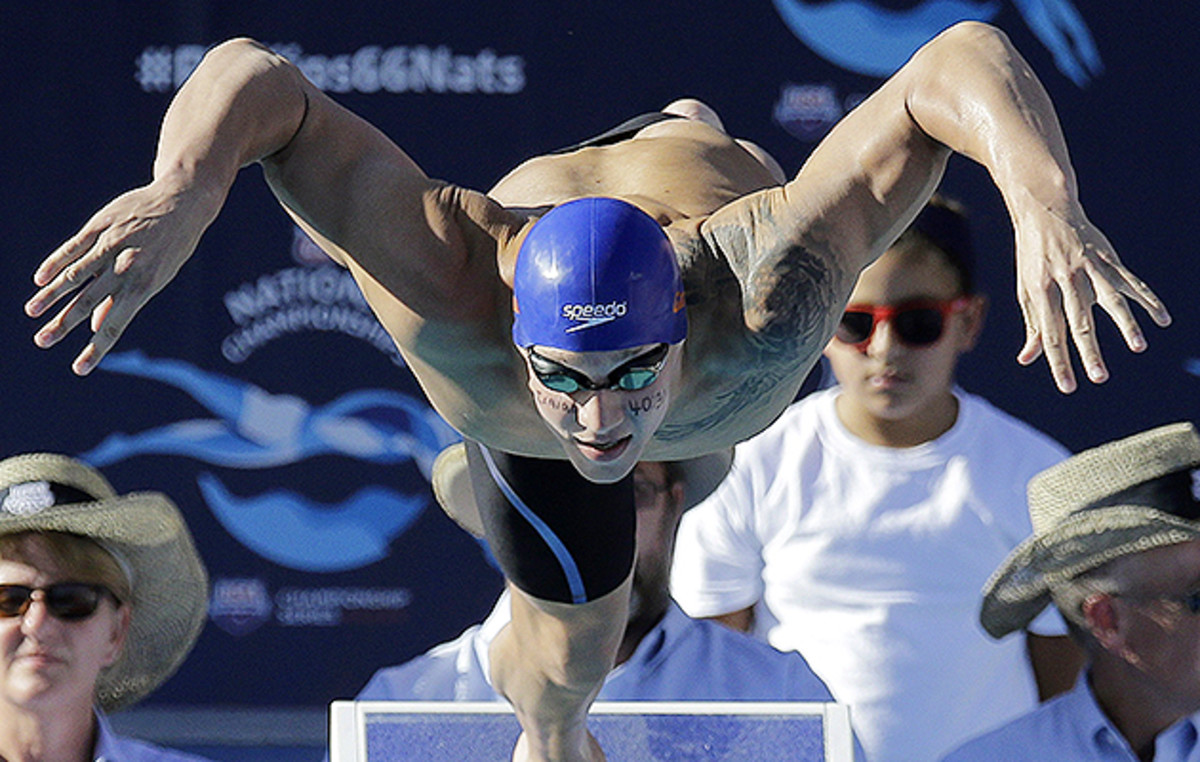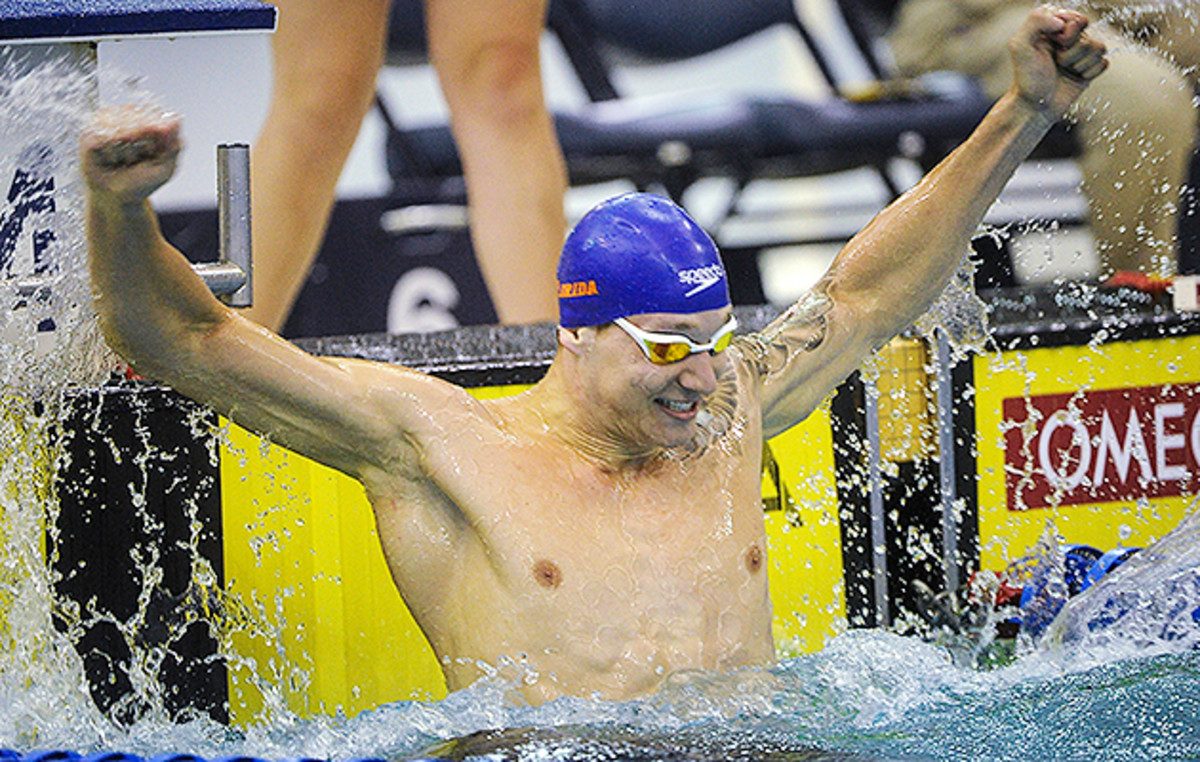How a hiatus helped Olympic hopeful Caeleb Dressel smash U.S. records

GAINESVILLE, Fla. — Caeleb Dressel ascends the stairs at the University of Florida’s practice facility wearing a collared shirt and before he sits for an interview, pauses facing a wall covered in images of Olympians. There is a photo of Ryan Lochte, his curly hair untamed, before his double-gold-medal performance in Beijing in 2008. There is his coach, Gregg Troy, before serving as the men’s coach in London in 2012. Every one of Florida’s Olympic swimmers from the past 30 years is staring right at him, but he isn’t looking back. The only reason he’s still standing is because he wants to know if there will be any pictures taken of him today. When he is told there will only be an interview, he quickly replaces his collared shirt with a T-shirt and reclines on a couch, relaxed.
The 19-year-old Caeleb is widely considered to be among the best young sprint swimmers in America. The University of Florida swimmer won national titles in the 50-meter and 100-meter freestyle in 2015, clocking the third fastest 50 free in the world that year (behind France’s Florent Manaudou and American Nathan Adrian). At the 2016 SEC Championships in March, he swam the fastest 50-yard free in history, 18.39 seconds.
And at the 2016 U.S. Olympic Team Trials, which begin Sunday in Omaha, he is expected to secure spots for the 50- and 100- free events on the men’s team in Rio this summer.
In some ways, it shouldn’t be a surprise that Caeleb is on the cusp of what will almost undoubtedly be a decorated Olympic career. Since he was 13, he has been smashing age-group records in sprints seemingly with ease. But his relationship with the water has been more turbulent than his smooth strokes would reveal.
• Michael Phelps enjoying the final laps of his indelible swimming career
Caeleb remembers when his parents first told him they’d signed him up for swimming. He was four years old and riding in his car seat home from preschool when he heard the news. “I said no right away,” Caeleb says. “My first memories of swimming are all horrible, too.”
But looking back, he realizes that diving in was inevitable. Michael and Christina, his father and mother, both worked, and they needed to occupy their four children with after-school activities. There was a community pool near Michael’s veterinary practice in Jacksonville, Fla., and because he himself had swum collegiately at Delaware from 1976 to ’79, swimming seemed like a simple solution.
Caeleb would have preferred to stick to soccer, but when he started winning races, his competitive instinct sank in. Once, when he was about five years old, he even entered a race uninvited. While waiting for his older brother’s race at a River City recreational league meet in Jacksonville, Caeleb slipped away from Christina and climbed onto the blocks for a six-and-under boys’ 25-yard freestyle. When he reached the other side of pool first, he splashed around and embarrassed his mom,asking, “Where’s my medal?”

Medals, trophies and accolades would come quickly. At the 2011 Junior National Championships in Palo Alto, Calif., he broke the 13–14 national age group record in the 50-meter freestyle. In 2012, he erased the 100-yard free record in the 15–16 age group that had stood since 1990. In Jan. 2013, he was featured in Sports Illustrated’s Faces in the Crowd.
But as his times decreased, the pressure increased. On social media before every competition, he would see people sharing how they expected him to break another record. If he didn’t, he figured, he would be a disappointment.
• How Katie Ledecky became the world’s most dominant swimmer
He tried to keep his teenage years as normal as he could. Even though he swam for the illustrious Bolles School Sharks swimming club in Jacksonville, he enrolled academically at Clay High School, the public school near his family’s 60-acre home in Green Cove Springs, Fla. But swimming for both teams meant that he had to compete nearly year-round, and he gave himself almost no time off during his first three years of high school.
The grind (and record-breaking) seemingly never stopped. The summer before his senior year, Caeleb committed to UF. At the Junior World Championships in Dubai, he broke Michael Phelps’s 17–18 age group record in the 100-meter free. At the Winter Junior Nationals in Greensboro, N.C., he became the first person under the age of 18 to swim the 50-yard free in less than 19 seconds.
“When he touched the wall, every other college coach in attendance screamed out,” Florida sprint coach Steve Jungbluth says. “But we kind of thought, ‘Oh geez. The pressure is on.’ I mean, if he doesn’t swim faster with us, we’ll look like idiots.”
• Tyler Clary looks to repeat his gold-medal London performance in Rio
Caeleb, who had to be hospitalized with breathing issues during the second day of competition but returned for the third, felt that mounting pressure more acutely than ever. All those 45-minute drives to practice, all those flights to national and international competitions, all that energy expended trying to ignore his own hype and live a normal life—they had all exhausted him. After surgery to repair a deviated septum, he decided not to swim his senior year of high school. Although he didn’t tell his coaches this at the time, he thought seriously that, at 17, he was finished swimming competitively forever. “For five months,” he says. “I was bone dry.”
During that time, he kept himself busy managing the Clay baseball team and ran track and became closer with his little sister, Sherridon (who will join him as a collegiate swimmer this season at Florida). His parents also arranged for him to see a sports psychologist.
“I was just trying to figure some things out spiritually. I wanted swimming to be something that I loved, something that I was motivated to do for myself,” he says. “I guess you could say it was a walk in the wilderness.”
• Debate: Who will be USA Basketball’s breakout star at Rio Olympics?
Finally, after five months, Caeleb texted a picture of the pool at Bolles to his coach at the time, Jason Calanog. (At the time, Calanog was in Colorado Springs at the time for an Olympic coaching summit.) He was getting back in the pool for the first time since his break.
“I remember getting in the water and feeling so refreshed,” Caeleb says. “I remember coming up and just looking around and seeing my teammates. They were doing their own things and not thinking anything of me, but it meant so much to me. It felt like such a historic moment for my life, a monumental moment. It was like being baptized again.”
Troy and Calanog, who is now an assistant coach at Texas A&M, agree that Caeleb’s time off probably slowed his development by a year. “But the alternative,” Calanog says, “is that he might have stopped swimming entirely.”

At Florida, Troy learned to control Caeleb’s environment. He asked the sports information department not to broadcast that Florida had recruited the next great collegiate swimmer. He understood that Caeleb’s focus was so intense that he only required five-minute meetings with him, rather than the half-hour sessions he routinely had with his other athletes. And when he could see Caeleb becoming overwhelmed again, Troy would send him home for a weekend.
Caeleb, too, began to recognize his own patterns. He found ways to have fun when he wasn’t training by challenging teammates to ping-pong competitions, filming mock-PSAs about scooter safety, making time for Call of Duty: Zombies each night with his roommates and for visits to UF’s Lake Wauburg most weekends. Paddle boarding, tubing—those were good refreshers for how much fun being in the water should be. And he got a reminder tattooed on his left shoulder—an eagle with wings spread to remind him of Isaiah 40:31, his favorite Bible verse: “But those who hope in the Lord will renew their strength. They will soar on wings like eagles; they will run and not grow weary, they will walk and not be faint.”
• Ryan Lochte: My rivalry with Michael Phelps is one of the best in sports
Caeleb was named the 2014 SEC freshman swimmer of the year and was selected first-team All-SEC in 2014–15, but he truly began to leave his mark nationally this past season as a sophomore, when he won two national titles and firmly added himself to the Olympic conversation.
“The amazing thing is, he has still never had a perfect race,” Troy says. “I think his best is still four years or eight years down the line. He’s still just 19. He’s a little boy both from an experience standpoint and a background standpoint, but he’s a man in the way he handles himself and uses the skills he has.”
Caeleb doesn’t think about four years or eight years from now. He used to obsess over those kinds of expectations, but now he swims for himself, his family and his faith. He believes he’ll qualify for the Olympics, that he’ll medal one day, but for now, he is just enjoying the journey toward Rio. And he knows that’s more important.
When the interview is over, he offers a high-five, a sincere thank you and a smile. Then he turns his back on those Olympians and their expectations and walks down staircase singing to himself.
